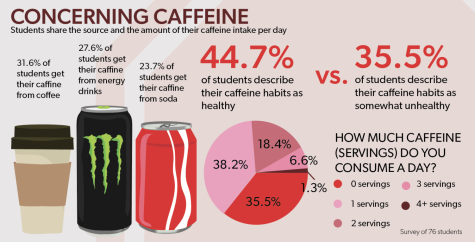Craving Caffeine
March 20, 2023
Teens’ often unhealthy sleep cycles can lead to another unhealthy habit: caffeine consumption. When students can barely stay awake, turning to caffeinated beverages like coffee and energy drinks to help seems like an obvious and easy solution. However, it can also lead to health issues down the line.
Senior Jayden Mendenhall is one student who regularly drinks coffee in the morning and energy drinks before she goes to work. Mendenhall has noticed how not drinking caffeine can affect her.
“I don’t necessarily view it negatively,” Mendenhall said. “I feel like it isn’t that bad for me, but it is definitely an addiction because when I don’t drink caffeine, I can feel it. I can tell I’m going through withdrawal and stuff. I get really tired and I don’t want to talk to anybody.”
Mendenhall cites her sleep schedule as the source of her caffeine addiction.
“I think I started getting into the habit because of my lack of sleep,” Mendenhall said. “I was staying up super late, so in the morning, I started noticing that I was super tired. I just tried to make up for it through caffeine. I just got hooked on it.”
According to Lauer, although caffeine consumption can help people stay awake, it can also come with a myriad of negative effects, some more immediate than others.

“It can make us more alert but when overdone it can make us jittery, edgy [and] anxious,” Lauer said. “It is also important to keep in mind that the adolescent brain is still developing and maturing and using psychoactive medications of any type may interfere with that maturation process. Caffeine can also work in the kidneys to make us urinate more, which can lead to mild dehydration if you’re not getting in enough water.”
Mendenhall believes that the caffeine helps make her schedule more manageable.
“My average weekday is I wake up at 6:30 and I don’t stop doing stuff and working until about 9:30 at night,” Mendenhall said. “I get up in the morning, I go to school, [and] I go straight from school to work. I don’t get home until like 9:30. Without caffeine, you just wouldn’t be able to do that … You just kind of have to make up for that make up energy somehow.”
To avoid having teens’ caffeine intake affect their sleep schedules, Lauer advises students to be conscious about the amount of caffeine they are drinking and to avoid consuming it later in the day.
“The suggestion is to keep it to one cup of coffee a day, or no more than 100 milligrams a day,” Lauer said. “Remember that many soft drinks contain caffeine as well so for instance a 16 ounce Coke has 65 milligrams of caffeine. Most “energy” drinks work by adding caffeine, so you should read labels to understand what is going into your body. In addition, the general advice is to not drink caffeine after noon; everyone is different, but for some people drinking caffeine later in the day can interfere with getting good sleep that night.”